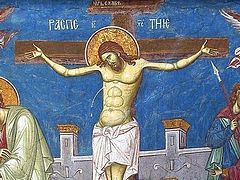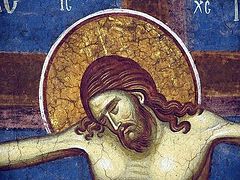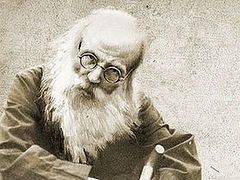My life here in Romania has been full of events, some better and some worse. I do not accuse anyone; I blame absolutely nobody because all of these things were sent by God to benefit my soul. Somebody once asked me if my sufferings in prison helped me in any way. I answered, “It is not that they helped me in some way, but I am the product of these sufferings.” If I do something, if I am something, if somebody sees anything in me, know that it is due to suffering. Without this suffering I am nothing! It is possible that of all the difficult questions for the human person, suffering is the most inexplicable. Why is suffering necessary? I lived an experience of suffering which enriched my soul, and I believe that suffering is necessary for me. But it is very difficult to accept this thing.
When I was in prison, we were asking each other, all of us brothers, “Why suffering? Why us? Out of all the millions of Romanians, why were we chosen to suffer? Where is the sense in it all?” And God did not reveal any of His intentions to us. We cried out to Him every day to decrease our sufferings, but it seemed that He loaded us with more instead. Ever since I was released from prison I have carried with me this sign of pain which seems to have marked my entire life. After my second imprisonment I left for the West, I traveled throughout all the countries of Europe, and I went to America to speak about what happened in Romania. My intention was this: I cannot keep silent as long as there exists in Romania suffering, injustice, communism, and the destruction of churches and of the human personality. During my pilgrimage I arrived at a Catholic monastery and slept in the monastery library. There I found, among so many books, a small booklet containing Christian maxims. I opened it by chance to a page where I saw words of Paul Claudel, a famous French writer. He said this: “God did not come into the world to eradicate suffering; He did not come even to explain it. God came into the world to fill human suffering with His presence.” Did you hear that? To fill human suffering with His presence! Then I understood that during the moments in which we were crying, or when we were revolting, or when we were shouting, “Lord, what are You doing with us?!”, He was in us more than in all the others, even with all of our sins and weaknesses. He filled our suffering with His presence. Then I understood exactly the deep meaning of this suffering: God is present in us!
“Thus, God Dwells In Us”
Your relationship with God—if you feel that God has answered you—is a special bond which cannot be explained. However, if I would try to define faith, prayer, and the mercy of God, I would only be using words of human reasoning that have nothing to do with God Who is above all reasoning. God is outside of the world—He is only found in love. I cannot explain all of these things to you because they cannot be explained. They form part of a mystical relationship of man with God, which someone may feel or may not feel, may practice or may not practice. There is no middle way.
It is not possible to speak today with God, tomorrow to curse Him, the next day to praise Him, and so on. You need to have a direct line in your relationship with God: a line of faith, of your nothingness before God, and of understanding that you are nothing before God because of your sinfulness, not because God did not create you pure. God created you pure, but you have defiled yourself with sins, you have wallowed in all sorts of filth, and you have damaged your heart, soul, and mind. Your mind works against the good, your heart has grown cold towards God, and it no longer loves anyone—you are hardened. All of these things change your relationship with God; they wear it out and break it.
We need to repair this bond through love, striving, and prayer. Let us have love for God and for our neighbor because it is not possible for someone to say that he loves God, Whom he has not seen, and not to love his neighbor whom he has seen (cf. 1 John 4:20). It is impossible to love God and not our neighbor. Our relationship with God has one end in our heart and one end in His hand. Through this relationship of faith, love, and good works, we enter into the will of God, and God abides in us. It is, as I have said, difficult to explain. Only those of us who have faith, who have striven on the road of life at least to do good little-by-little and to strengthen ourselves in faith, have established this relationship. But I do not say that it is permanent. We may break it with our sins, but there still exists a spiritual channel through which we can speak with God.
I remember when I was little, there were eleven of us children and times were difficult. My mother would pray to God just as I am speaking with you. She would complain that one of the children became sick, the cow did not produce any milk or it did not have calves, the chicken did not lay eggs… She would tell everything to God as if she was in a direct relationship with Him. And know that God answered her. Mama knew that God is with us, and she spoke to Him as we speak to each other, as friends. You tell your pain to your brother or friend, even to the finest detail. God knows about it, but we are still obligated to tell it to Him and to give Him praise. I want you to understand that it is possible to have a familiar relationship with God, as between son and father or as between friends, more or less. This type of relationship is what God requests of us. In silence, in simplicity, and in humility we can establish this relationship with God, so that we will have somewhere to go when we are in trouble and when nobody receives us. When everybody abandons us, when our life seems to be lost, yet still God opens His arms and receives us. This is an extraordinary mystery.
This I say to you: Try to pray! Try to speak with God unceasingly!





